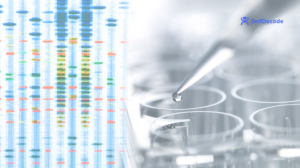In the last few years, direct-to-consumer DNA testing has exploded in popularity. Today, a DNA test can tell you everything from who your ancestors were to give you health recommendations based on any conditions or illnesses you may be predisposed to. Among all of the promising secrets that your DNA has locked away is a surprisingly bold claim: predicting how long you’ll live.
But can your DNA really predict your lifespan? Is there a secret in your saliva that reveals how many years you have left? In this article, we’ll take a closer look at fact versus fiction when it comes to what DNA tests can, and can’t do.
What DNA Tests Analyze
Most DNA tests sold to consumers focus on what are called “single-nucleotide polymorphisms” or SNPs. That’s a fancy way of saying “tiny variations at specific positions in your genome”. The machines that analyze your saliva typically can only read a few hundred thousand SNPs in your DNA. That sounds like a lot, but there are over 83 million other spots out there.
In order to learn about the rest of your genetic code – those 83 million other spots – companies like SelfDecode use a statistical process called “imputation”. This process looks at the parts of your DNA that were read, compares them to massive datasets, and fills out the rest of the data based on this training. It may seem like a lot of information is missing, but with advances in artificial intelligence, machine learning and other smart technology, these educated guesses are right about 99.7% of the time.
Thanks to this process, SelfDecode can turn raw genetic data into reports on traits that range from metabolism to disease risk, making more specialized tests, including longevity screening, possible.
Which Genes Predict Our Lifespans?
Geneticists have uncovered certain genes that tend to influence human lifespans. For example, variations in FOXO3, which is involved in the body’s resistance to stress, have been linked to living beyond age 95. Telomere-maintenance genes like TERT and lipid-regulating genes like APOE deal with cellular aging and heart health. SelfDecode’s Longevity and Healthy Aging Summary Report details these important genetic markers, as well as sharing how your DNA may predispose you to faster or slower aging.
What’s more, the DNA Longevity Screener pulls together risk data for over 25 different conditions tied to longevity – from coronary artery disease to Alzheimer’s disease – and formulates them into both a 10-year, and lifetime report. SelfDecode does more than just deliver DNA reports. It also recommends specific longevity supplements, such as Rhodiola rosea, which in animal models, has enhanced the body’s response and resilience to stress.
SelfDecode has been able to map these supplements to specific genetic pathways so that customers can see how their unique genetic code might interact with these different supplements. This means rather than just knowing “your genetics predispose you to heart disease”, you now have actionable steps to take control through a combination of lifestyle, diet and supplementary changes.
What Are DNA’s Limitations? What Can It Not Tell You?
Despite all of the advances in genetic decoding and the technology used to understand it, there are still things that DNA can’t predict. The genetic reports that you get from SelfDecode, for example, are designed for informational and educational use only and cannot substitute the professional advice of your doctor or medical specialist. Nor can DNA tests guarantee a specific outcome.
For example, diet, exercise, stress and toxin exposure heavily influence the aging process. Your DNA may genetically predispose you to certain conditions, but real-world outcomes depend on your behavior. What’s more, DNA methylation and histone modification are shaped by your environment, and they can alter gene expression in ways that SNP-based tests can’t capture.
Predictive models pull from population averages, so having a genetic variant that increases your risk to a certain condition or illness by 20% means that your odds are elevated, but not a certainty. So while you can learn which areas to monitor more closely, together with your doctor, DNA can’t pinpoint exactly when you might die or guarantee that you’ll live to 100.
Your Genetic Code Meets Lifestyle and Environment
The real value of longevity genetic testing lies in its ability to help you make more significant lifestyle changes that help reduce your risk for certain conditions or illnesses. On the SelfDecode blog, we recommend evidence-based strategies, such as following a Mediterranean-style diet, engaging in HIIT (high intensity interval training) and improving sleep among other things, alongside your genetic report.
Plus, understanding the role that telomeres play in aging can help you take steps to actively reduce your stress levels. Alongside targeted supplements to help boost chromosome integrity, you can help give your body the right nutrients to fortify your DNA structure. In short, combining your DNA report with actionable health tips and supplements can help you turn genetic predispositions into more proactive health results.
So Can DNA Really Predict Your Lifespan?
Not directly. Although genetic analyses can show you what you’re predisposed to, including age-related diseases, as well as areas that could be affected by aging, they are still estimates and not certainties. Platforms like SelfDecode give you a toolkit that combines imputation-based DNA variant analysis, along with ancestry data, peer-reviewed research and personalized recommendations. Think of it as a 360-degree personalized health report that helps you see what you’re genetically at risk for, and how you might take steps to protect yourself.
The bottom line is that your genes are only part of your story. Your environment, lifestyle, diet and behaviors, plus the wrench of sheer chance being thrown into the mix, are what ultimately defines how long you’ll live. Use DNA tests and platforms like SelfDecode as a guide to help you understand what steps to take, when, and how, to better improve your life and age with style and vitality, the way you’ve always planned to.





